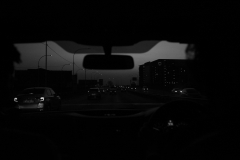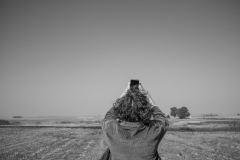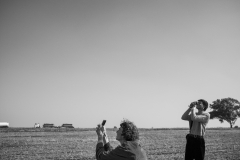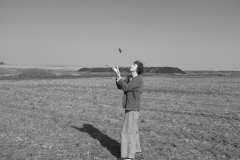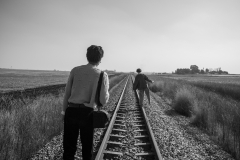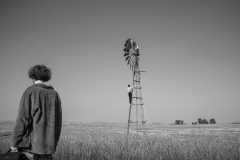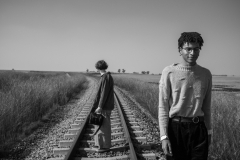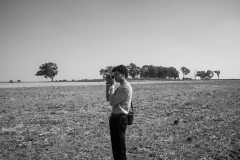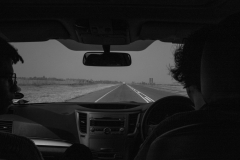When Valarie Kaur LAW ’11 first heard about Ahmed Sharif, the New York City cab driver who was attacked Aug. 24 by a drunken passenger for being Muslim, she did not know how to respond.
“We are witnessing a wave of hate crimes across the country, not fully being covered on the news,” she said. “This [situation] is becoming insidious, life-threatening, and serious, but I found myself in a paralysis.”
Within a week, Matthew Matera LAW ’11 came to her room to talk about their mutual anger, and an idea was born. The pair now coordinates Common Ground, a nationwide campaign to combat and raise awareness of religious intolerance. The group joins other Yale organizations, including Jews and Muslims at Yale, the Muslim Student Association, and J Street U (a national organization for Middle East peace), that have independently planned responses to a recent perceived spike in intolerance toward Muslims.
Common Ground has yet to make a website or issue a press release, but the organization already has more than 70 volunteers across the country, some of them Yale undergraduates. Kaur said the group will ask student leaders to host dialogues in schools across the country and will provide schools with “toolkits” to guide discussion.
Students filmed a video, directed by Jacob Albert ’11, for the group Sunday night in which members of the Yale community read from Common Ground’s charter.
Kaur, herself a Sikh, is no stranger to anti-religious sentiment in the United States. After a Sikh man her family knew was murdered for wearing a Turban soon after the Sept. 11 attacks, she went across the country recording stories of violence and vandalism. Kaur spent the next five years filming what would eventually become “Divided We Fall,” the first feature-length documentary on crimes against Sihks, Muslims, and Arab-Americans after the Sept. 11 attacks. The film went on to win awards at the ReelWorld Film Festival of Toronto and the Indian Film Festival of Los Angeles.
Despite extensive research for her film, Kaur said she was still surprised by the recent controversy surrounding Park 51, an Islamic community center proposed for a site two blocks from Ground Zero in Lower Manhattan.
“I knew that Islamophobia was a deep part of our cultural consciousness,” she said. “I did not expect that it would become so mainstream, as it has in the so-called ‘Ground Zero mosque.’ ”
At the same time, three other Yale organizations are also mobilizing on the issue. Jews and Muslims at Yale, which was founded in the wake of Sept. 11 but became inactive in years since, recently renewed its efforts to “create dialogues and build connections” between the two religious groups, said JAM co-president Faisal Hamid ’13. The group will co-sponsor an event with the Joseph Slifka Center for Jewish Life at Yale for the Jewish holiday of Sukkot to discuss public displays of religion in secular countries, said Hamid, who added that the theme is especially important in light of the resistance to the Park 51 center in New York.
The group has collaborated with the Muslim Students Association, which is also beginning to plan events to address current events, said MSA Political Action Chair Mustafa Al-Alusi ’13. He said possible events could include a screening of Kaur’s film and a panel discussion of the Aug. 24 attack.
Al-Alusi, who could not recall having ever heard of incidents involving anti-Islam sentiment on Yale’s campus, said Yale’s Muslim community itself has not made as many calls for action in light of recent events as other groups.
“We seem pretty far detached from all of this
,” he said. “The effect the news has is greater on other people than us here; we’re still kind of in a bubble.”But some students are looking outside the relatively accepting campus community.
J Street U, a national organization primarily led by progressive Jewish students to promote Middle East peace, has released a pledge, entitled “Stand Strong Against Islamophobia,” said Ben Alter ’11, co-president and founder of the Yale branch.
In the coming weeks, Alter said he hopes to circulate the document (which protests Park 51 opposition and threats of Qur’an burnings) for signatures. He also participated in Sunday night’s filming for the Common Ground video.
“As Jews we know the dangers of hatred and violence directed against religions and ethnic minorities,” he said, “and for us to stand idly by while other groups are denigrated, persecuted and harassed would be criminal.”
Correction: Sept. 8, 2010
An earlier version of this article mistakenly quoted a premature draft of the group Common Ground’s charter, which the News received from the director of a film promoting Common Ground. The finalized copy of the group’s charter will be posted on Common Ground’s website today.








